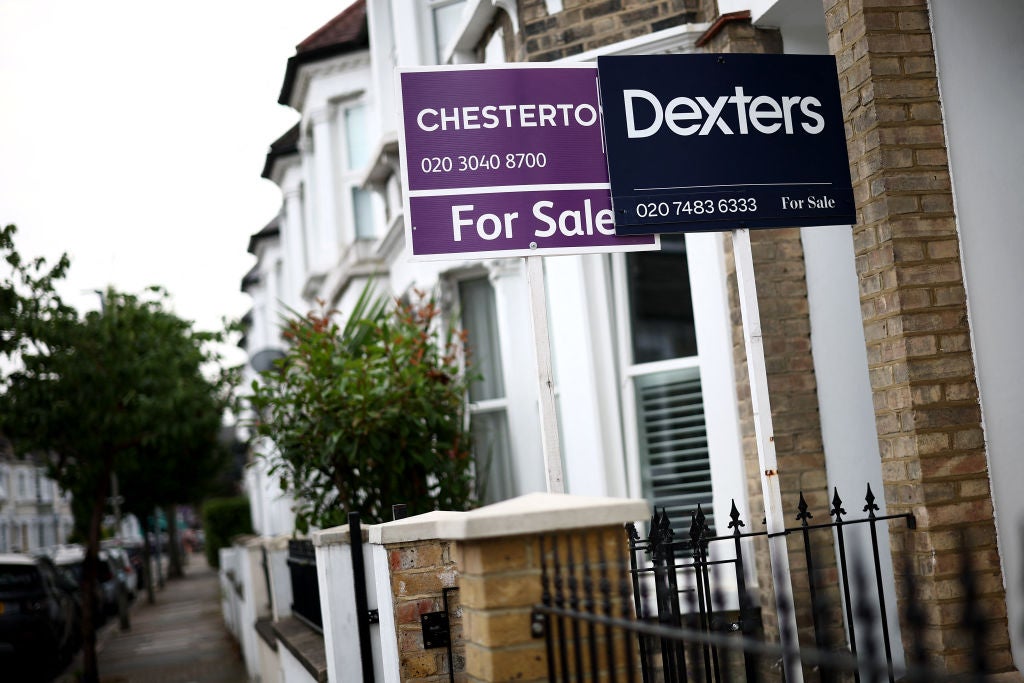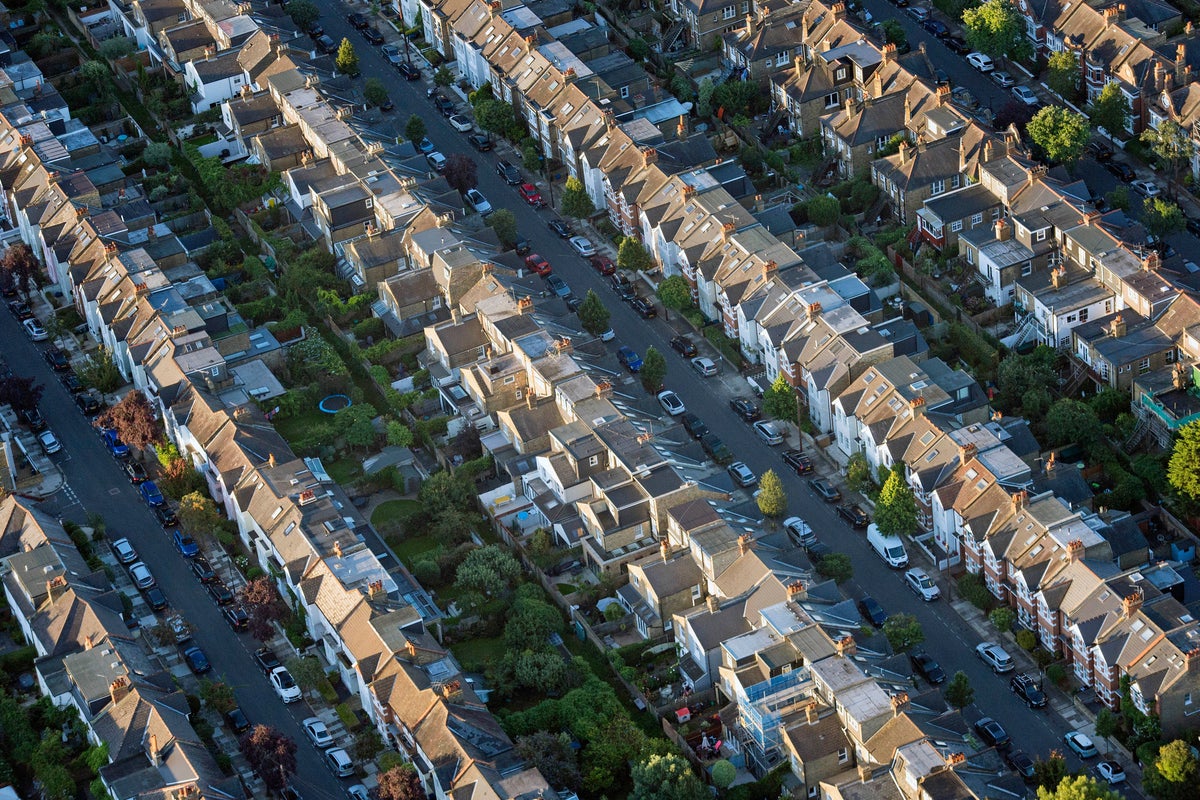Gen-Z are being “locked out” of home ownership, campaigners have warned, as first-time buyers now face paying up to six times more for a home than their parents.
An analysis of rental, property and salary data by The Independent reveals that the average homebuyer in 1995 had to save just a third of their salary – £5,000 – to put down a deposit, while today’s first-time buyers are forking out average deposits nearly twice as high as the average salary.
Land registry data in England shows that the average house price now costs £286,594 – nearly six times higher (£50,679) than three decades ago.
But the average salary has barely more than doubled in that time, from £15,034 to £37,430, while the upfront cash needed for a deposit is more than 10 times greater on average.
Rents are also soaring, with average monthly rates going from £1,025 to £1,343 in the past five years alone – a 31 per cent jump, according to the UK-wide private renters index.
“If the government does not slam the brakes on soaring rents, many may never be able to buy their own home,” Ben Twomey, chief executive of the campaign group Generation Rent warned.
“Generation Z is Generation Rent. They are locked out of home ownership because they face higher rent costs than any other generation before them. Trying to save for a deposit to buy a home while rents soar is like pushing a boulder up a hill that keeps getting steeper and steeper.”
Young people who have managed to save for deposits say they feel they have had to “sacrifice” a lot to do it.
“It’s giving up your entire social life,” said Paris, a 26-year-old living in London, who started saving to buy her own place after a break-in and safety concerns while renting.
Get a free fractional share worth up to £100.
Capital at risk.
Terms and conditions apply.
Go to website
ADVERTISEMENT
Get a free fractional share worth up to £100.
Capital at risk.
Terms and conditions apply.
Go to website
ADVERTISEMENT
“My mum asks me, ‘What do you do, you just stay in all the time?’ And I say, ‘Well yeah, because we can’t afford it.’”
Even mortgage advisers admit that the challenges facing younger buyers are worse than in previous decades.
Ben Thompson, deputy CEO of the Mortgage Advice Bureau (MAB), bought his first home at age 22 with a near-100 per cent loan. But he knows that his situation would be more difficult now.
He told The Independent: “I hate the arguments where people just say, ‘Oh, in our day, we had to save, and they’ve got it much easier these days.’ I don’t buy into that. I think it’s tougher to buy today than it was before.”
And being frugal alone will not be enough. Real estate and housing economist Chris Foye, who lectures at University College London (UCL), said that advice for Gen-Z to simply save or invest more wisely misses the full picture.
“I mean, there’s only so much you can do with a little, right? There’s only so much we can tell young people about investing wisely when they don’t have very much to invest in the first place,” he said.
“People are paying so much for rent, and their incomes aren’t as high as previous generations enjoyed. I don’t think [saving more] is going to shift the dial.”
The average annual income in 2025 is £37,430, data from the Office for National Statistics (ONS) shows. After tax and national insurance, the average earner is left with £30,469 a year.
Over half of this (£16,116) can easily be spent on rent, with average monthly rates at £1,343, according to the price index of private rents (PIPR).
But the average house deposit is now £61,000, according to Halifax, with starter homes being sold for around £311,000.
This means that homes are now being sold for around eight times the average salary, with deposits nearly double a year’s wage – and 12 times higher than they were in 1995.
A person on an average salary, paying average rent, is left with around £1,150 a month for all other costs, including bills, lifestyle, food, travel and savings.
If saving £500 of that a month, it would take over a decade to build up the average deposit, before even beginning to pay a hefty mortgage.
All this means there is now a growing divide between people with access to generational wealth – otherwise known as the “bank of mum and dad” – and those without.
Data from estate agents Savills shows that over half of first-time buyers had some form of support from their family last year, to the tune of £9.6bn in gifts and loans.
But the economic disparity among homeowners and renters risks creating greater financial divides.
Over a 30-year period, The Independent’s calculations, from ONS data, show that renters could spend £483,000 on average, if private rental prices remain the same, without the financial security of owning their own home to show for it.
“It’s not just younger generations, it’s middle-aged, older generations as well, who also haven’t accumulated housing wealth or other forms of wealth,” Mr Foye told The Independent.
“They have to, therefore, make sacrifices, right? They have to live in smaller spaces, change their life decisions. They might have to live further away from work. And these are all very unfair and uncomfortable ways in which people deal with these affordability constraints.”
Many young Britons are therefore likely to be “trapped renting” for decades, Mr Twomey warned.
“Gen-Z have spent their entire adult lives facing housing costs that are rising much quicker than their earnings,” he said.
And home ownership rates remain low among young people (aged 34 and under), at just 39 per cent, according to the Institute for Fiscal Studies. This is substantially lower than the peak of 59 per cent in 2000, but has been steadily increasing in the past decade.
Nonetheless, some in Gen Z are determined to get on the housing ladder regardless, and are willing to make those sacrifices for the long-term gain.
Earlier this year, Paris put down a £14,000 deposit on a small flat in southeast London.
She had saved for several years, after a series of negative experiences while renting, which pushed her towards home ownership.
Before buying her home, Paris was paying £950 a month on renting a room – and when trying to find a new rental, she was shocked at the soaring prices.
“At that moment, I tapped out. If a room share is £1,400, I’d rather put that money in my own home,” she said.
Others are turning to high-risk investments to raise the cash. Luke, 24, has put the majority of his savings into cryptocurrency.
“Truthfully, I think the only solution to [large deposits] is some high-risk, high-return way like crypto. The British population almost don’t have a choice.
“Of course, it’s affected my social life a lot. It’s been frustrating. But I try not to focus on the short term. The UK is a very land-ownership-based economy. And as soon as you own property, life just gets dramatically easier,” he told The Independent.

With a growing population and stagnant real estate market, the Labour government is focusing on boosting housebuilding and protecting renters by banning “no-fault” evictions and making all tenancies periodic.
Mortgage adviser Thompson believes that boosting home ownership would also be beneficial for chancellor Rachel Reeves’ economic growth ambitions.
“More home ownership and home buying tends to drive a lot more economic activity and growth, which is definitely where the government’s coming from, quite rightly at the moment,” he explained.
“You’ve got a supportive regulatory environment as well. So if you combine all those factors, there is a cause for optimism.”
The government has also allocated £39bn for affordable housing over a decade – something Paris believes is key to tackling the problem.
“The only solution to getting out of the housing crisis is to build more council housing,” she said.
“Home ownership in this country is a commodity; it’s an investment and a vehicle to your pension, and it should not be like that.”
A spokesperson for the Ministry of Housing, Communities and Local Government said: “The acute and entrenched housing crisis this government inherited has seen a generation locked out of homeownership and paying a record rent bill.”
“That is why our Plan for Change set out steps to get Britain building and deliver 1.5 million homes, while tackling excessive rent demands.”
“We have already announced the biggest boost to social and affordable housing in a generation, and our Renters’ Rights Bill will transform the private rental sector for tenants.”





